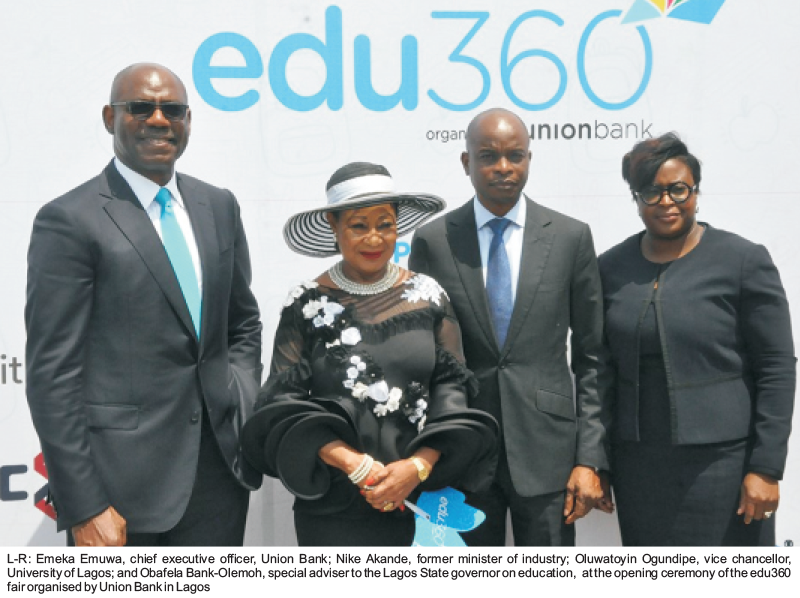 Union Bank of Nigeria plc, one of the country’s oldest financial institutions, said on Tuesday that it would intensify its commitment to solution driven interventions in local educational infrastructure with the use of its intercontinental connections to pull in the required financing.
Union Bank of Nigeria plc, one of the country’s oldest financial institutions, said on Tuesday that it would intensify its commitment to solution driven interventions in local educational infrastructure with the use of its intercontinental connections to pull in the required financing.
Adekunle Sonola, an executive director at the bank said at the opening of edu360, a forum organised by the bank to examine the strategic role of education in Nigeria’s development, said with the realisation of the enormous local cost of infrastructure the bank has been initiating tailored financial solutions to ensure educational centres were equipped with 21st century resources.
The bank, he said, has been achieving results in making the right partnerships and attracting international financing for interventions in education.
“In Nigeria today, we have intervention in agriculture to grow crops. We need intervention in education because we need to grow minds. It’s important to grow minds because it’s the mind that we grow that will ensure that the future is assured. At Union Bank, we have put together a group of solutions for the educational world. One of the most impactful of the solutions is how to finance the infrastructure. We have schools that need internet access, computer systems; power generating sets because the operating expenses are enormous. We intervene through providing finance at the right time,” Sonola said.
The keynote speaker, Modupe Adefeso-Olapeju, managing director, The Education Partnership Center, said the need to have massive investments in the educational sector is as imperative as the need to entrench the enabling environment for professionals to thrive.
Describing the trend of medical professionals exiting the country upon completion of their studies as subsidizing foreign economies, she said the brain drain would only be reversed through adequate funding of education and accountability measures needed to straighten the system.
She said: “In a clear case of giving what it doesn’t have, Nigeria is indirectly and effectively subsidizing the training and the healthcare systems in these countries. Incidentally the cost of producing doctors in the US is a huge problem with fresh doctors graduating with about N200, 000 in student loans. So I’m sure they are quite grateful to Nigeria for what we give them. From the perspective of the diaspora, almost $20 billion of transfer flows into the country every year and apart from expertise, this shows the potential of the capital that can be channeled into the health country. Therefore we need massive investment from all concerned.”
According to Adamu Adamu, minister for education, there is need for private sector intervention in areas of advocacy and funding of the promotion of quality education, provision of syndicated and long term loans to qualified and viable institutions for funding development of capacity building programs among others because the government cannot solely fix education.
Adamu, represented by Oluwatoyin Ogundipe, the vice-chancellor, University of Lagos, however, said efforts were being harnessed to improve the quality of education, with policies targeted at early childhood care through universal basic education, mass literacy, adult and non-formal education.
“The federal government recently presented a draft of education reform plan to stakeholders and development partners in an attempt to input the quality of education output. It contains key challenges and issues facing Nigeria’s education system and the ministries perspective on each of them,” he said.








Africa’s rising consumer market: A flight path for regional air travel